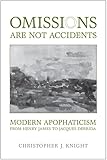Omissions are not Accidents : Modern Apophaticism from Henry James to Jacques Derrida / Christopher J. Knight.
Material type: TextPublisher: Toronto : University of Toronto Press, [2010]Copyright date: ©2010Description: 1 online resource (272 p.)Content type:
TextPublisher: Toronto : University of Toronto Press, [2010]Copyright date: ©2010Description: 1 online resource (272 p.)Content type: - 9781442640504
- 9781442685710
- 809/.93384
- PN3347 .K58 2010eb
- online - DeGruyter
| Item type | Current library | Call number | URL | Status | Notes | Barcode | |
|---|---|---|---|---|---|---|---|
 eBook
eBook
|
Biblioteca "Angelicum" Pont. Univ. S.Tommaso d'Aquino Nuvola online | online - DeGruyter (Browse shelf(Opens below)) | Online access | Not for loan (Accesso limitato) | Accesso per gli utenti autorizzati / Access for authorized users | (dgr)9781442685710 |
Frontmatter -- Contents -- Acknowledgments -- I. Preface -- II. Henry James (‘The Middle Years’) -- III. Ludwig Wittgenstein (Tractatus Logico-Philosophicus) -- IV. Gertrude Stein (Tender Buttons) -- V. Paul Cézanne and Rainer Maria Rilke (Letters on Cézanne) -- VI. Ernest Hemingway (In Our Time) -- VII. Martin Heidegger (‘What Is Metaphysics?’) -- VIII. T.S. Eliot -- IX. Virginia Woolf -- X. Samuel Beckett (Watt) -- XI. Mark Rothko -- XII. William Gaddis (The Recognitions) -- XIII. Vladimir Nabokov (Speak, Memory) -- XIV. Theodor Adorno (Negative Dialectics) -- XV. Susan Sontag (‘The Aesthetics of Silence’) -- XVI. Penelope Fitzgerald (The Blue Flower) -- XVII. Krzysztof Kieślowski (The Double Life of Véronique) -- XVIII. Frank Kermode (The Genesis of Secrecy) -- XIX. Jacques Derrida (‘How to Avoid Speaking: Denials’) -- XX. Epilogue -- Notes -- Index
restricted access online access with authorization star
http://purl.org/coar/access_right/c_16ec
Ludwig Wittgenstein wrote in a 1919 letter that his work 'consists of two parts: the one presented here plus all that I have not written. And it is precisely this second part which is the important one.' In Omissions Are Not Accidents, Christopher J. Knight analyzes the widespread apophaticism in texts from the late nineteenth to the late twentieth century. In theology, apophaticism refers to the idea that what we cannot say about God is more fundamental than what we can; in literature and other works of art, Knight argues, it functions as a way of continuing to speak and write even in the face of the unspeakable.Probing the works of authors and intellectuals from Henry James to Jacques Derrida, Knight suggests that we no longer trust ourselves to speak about experience's most numinous aspect, and explores the consequences of the modern artist's tendency to imagine his or her work as incomplete. Ambitious in the scope of its investigation, Omissions Are Not Accidents lends insight into an important modern phenomenon.
Mode of access: Internet via World Wide Web.
In English.
Description based on online resource; title from PDF title page (publisher's Web site, viewed 01. Dez 2023)


